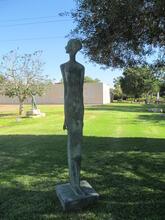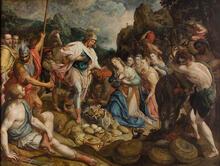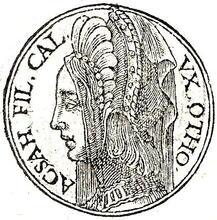Daughters of Lot: Bible
When the men of Sodom demand sexual relations with two messengers from God, Lot offers his daughters instead. The daughters and Lot, however, escape and live in a cave after Sodom is destroyed. There they have relations with their father and give birth to his sons. The purpose of their story is unclear; perhaps it is trying to defame the enemies of Israel or simply represents the daughters’ attempt to survive.
Article
When the men of Sodom demand sexual relations with two messengers from God, Lot, who has given the messengers hospitality, offers his two daughters to the men of Sodom instead. The daughters are living with their parents and have not had sexual relations with any man (19:8), although they are apparently betrothed (19:24).
Lot’s offer indicates that, at least from the perspective of the men who produced the text, a father might find it less shameful to allow his own daughters to become objects of forced sexual relations than to allow male visitors to become such objects (compare Judg 19:24). Lot’s daughters are spared this fate, however, and escape with their father before Sodom is destroyed.
Lot’s daughters live with their father in a cave after the destruction of Sodom, Gomorrah, and the other cities in the area. Fearing that no men are available to father their children, they make Lot drink wine on two consecutive nights and, while he is drunk, have sexual relations with him. In this manner the daughters bear sons, one of whom becomes the ancestor of the Moabites and the other of whom becomes the ancestor of the Ammonites; both people become enemies of the Israelites.
The story may be in part an attempt to slander Israel’s enemies by associating their origins with dubious sexual unions. At the same time, the desperate measures taken by the daughters probably indicate that, for many women as well as men in the ancient world, having children was the route by which one’s future welfare could be secured. Thus, the daughters’ apparently radical actions might also be read as an initiative to ensure their survival (compare Genesis 38).
Adelman, Rachel. The Female Ruse: Women's Deception and Divine Sanction in the Hebrew Bible. Sheffield Phoenix Press, 2015. See esp. Chapter 4.
Hendel, Ronald, Chana Kronfeld, and Ilana Pardes, “Gender and Sexuality.” In Reading Genesis, edited by Ronald Hendel, 71-91. Berkeley, CA: University of California Press, 2010.
Kalmanofsky, Amy. Dangerous Sisters of the Hebrew Bible. Augsburg Fortress Publishers, 2014. See esp. Chapter 4, “Lot’s Daughters.”
Meyers, Carol, General Editor. Women in Scripture. New York: 2000.










